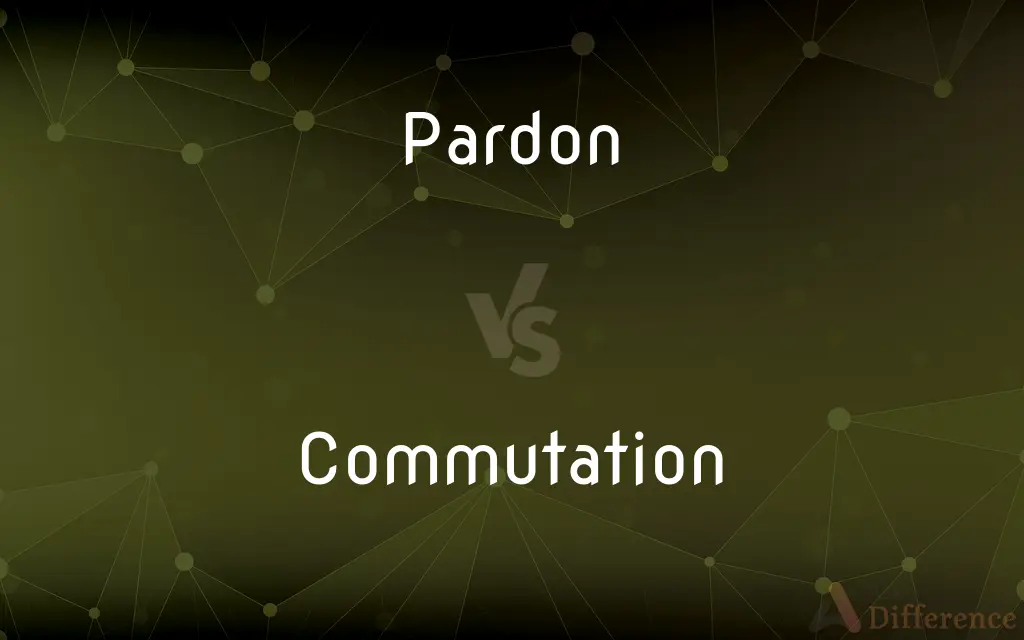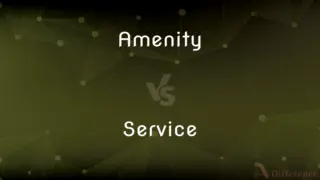Pardon vs. Commutation — What's the Difference?
By Maham Liaqat & Urooj Arif — Updated on April 25, 2024
Pardon is a legal act that forgives a crime and removes its consequences, while commutation reduces the severity of a punishment without forgiving the crime.

Difference Between Pardon and Commutation
Table of Contents
ADVERTISEMENT
Key Differences
A pardon is an act of clemency that completely absolves an individual from the legal consequences of their crime, effectively erasing guilt, whereas a commutation merely reduces the severity of a sentence without clearing the individual's criminal record.
Pardons are typically granted by a head of state or a senior executive and can be seen as a restoration of rights, including voting and public office eligibility, while commutation might be used to reduce a life sentence to a set number of years but leaves other legal disabilities intact.
The granting of a pardon can occur at any time, often after a conviction is fully served or even posthumously, suggesting a broader scope for mercy, on the other hand, commutation is usually considered during a sentence, particularly in cases where circumstances such as good behavior or changed sentencing laws are argued.
Pardon has a significant moral and social implication, implying forgiveness and often rehabilitation, whereas commutation is more pragmatic, focusing on the fairness and appropriateness of the original penalty.
In public perception, a pardon may restore an individual's reputation and social standing, suggesting a belief in their innocence or reformation, while commutation might be viewed as a mere adjustment to the penal terms, maintaining societal views of the individual as a convict.
ADVERTISEMENT
Comparison Chart
Definition
Legal forgiveness of a crime
Reduction in the severity of a punishment
Legal Consequences
Removes all penalties and restores rights
Reduces penalty but leaves some consequences
Timing
Can occur any time, often after serving
Typically occurs during serving
Scope of Clemency
Complete and absolute
Partial and specific
Public Perception
Often seen as a gesture of forgiveness
Viewed as an adjustment of sentence fairness
Compare with Definitions
Pardon
Complete forgiveness of a crime.
The governor granted him a pardon, restoring his civil rights.
Commutation
Reduction of a criminal sentence.
His life sentence was commuted to twenty years.
Pardon
Often symbolic of moral forgiveness.
His pardon was seen as a closure to a controversial judicial chapter.
Commutation
Does not erase criminal conviction.
Despite the commutation, the felony remained on his record.
Pardon
Absolution from legal consequences.
After receiving a pardon, she was able to vote and travel freely.
Commutation
Focuses on penal adjustment.
The commutation was argued on the basis of excessive original sentencing.
Pardon
Can be controversial in political contexts.
The president’s pardon of a political ally drew public outcry.
Commutation
Often based on changed perceptions or laws.
Commutation was granted due to new sentencing guidelines.
Pardon
May involve exoneration.
The posthumous pardon exonerated him of all charges.
Commutation
Less about moral judgment, more about fairness.
The commutation reflected evolving standards of justice.
Pardon
A pardon is a government decision to allow a person to be relieved of some or all of the legal consequences resulting from a criminal conviction. A pardon may be granted before or after conviction for the crime, depending on the laws of the jurisdiction.Pardons can be granted in many countries when individuals are deemed to have demonstrated that they have "paid their debt to society", or are otherwise considered to be deserving of them.
Commutation
The action or process of commuting a judicial sentence
A commutation of her sentence
Pardon
The action of forgiving or being forgiven for an error or offence
He obtained pardon for his sins
Commutation
The process of commutating an electric current.
Pardon
Forgive or excuse (a person, error, or offence)
I know Catherine will pardon me
Commutation
The property of having a commutative relation.
Pardon
A request to a speaker to repeat something because one did not hear or understand it
‘Pardon?’ I said, cupping a hand to my ear
Commutation
A substitution, exchange, or interchange.
Pardon
To release (a person) from punishment or disfavor for wrongdoing or a fault
A convicted criminal who was pardoned by the governor.
Commutation
The substitution of one kind of payment for another.
Pardon
To allow (an offense or fault) to pass without punishment or disfavor.
Commutation
The payment substituted.
Pardon
To make courteous allowance for; excuse
Pardon me, I'm in a hurry.
Commutation
The travel of a commuter.
Pardon
The act of pardoning.
Commutation
Conversion of alternating to unidirectional current.
Pardon
Exemption of a convicted person from the penalties of an offense or crime by the power of the executor of the laws.
Commutation
Reversal of current direction.
Pardon
An official document or warrant declaring such an exemption.
Commutation
(Law) Reduction of a penalty to a less severe one.
Pardon
Allowance or forgiveness for an offense or a discourtesy
Begged the host's pardon for leaving early.
Commutation
Substitution of one thing for another; interchange.
Pardon
Roman Catholic Church An indulgence.
Commutation
Specifically, the substitution of one kind of payment for another, especially a switch to monetary payment from obligations of labour.
Pardon
Forgiveness for an offence.
Commutation
(legal) The change to a lesser penalty or punishment by the State
Pardon
(legal) An order that releases a convicted criminal without further punishment, prevents future punishment, or (in some jurisdictions) removes an offence from a person's criminal record, as if it had never been committed.
Commutation
(linguistics) Substitution, as a means of discriminating between phonemes.
Pardon
(transitive) To forgive (a person).
Commutation
(electronics) The reversal of an electric current.
Pardon
(transitive) To refrain from exacting as a penalty.
Commutation
(obsolete) A passing from one state to another; change; alteration; mutation.
Pardon
To grant an official pardon for a crime.
Commutation
(obsolete) The act of giving one thing for another; barter; exchange.
Pardon
Often used when someone does not understand what another person says.
Commutation
(US) The process or habit of journeying to and from work on a regular basis; commuting.
Pardon
The act of pardoning; forgiveness, as of an offender, or of an offense; release from penalty; remission of punishment; absolution.
Pardon, my lord, for me and for my tidings.
But infinite in pardon was my judge.
Commutation
A passing from one state to another; change; alteration; mutation.
So great is the commutation that the soul then hated only that which now only it loves.
Pardon
An official warrant of remission of penalty.
Sign me a present pardon for my brother.
Commutation
The act of giving one thing for another; barter; exchange.
The use of money is . . . that of saving the commutation of more bulky commodities.
Pardon
The state of being forgiven.
Commutation
The change of a penalty or punishment by the pardoning power of the State; as, the commutation of a sentence of death to banishment or imprisonment.
Suits are allowable in the spiritual courts for money agreed to be given as a commutation for penance.
Pardon
A release, by a sovereign, or officer having jurisdiction, from the penalties of an offense, being distinguished from amnesty, which is a general obliteration and canceling of a particular line of past offenses.
Commutation
A substitution, as of a less thing for a greater, esp. a substitution of one form of payment for another, or one payment for many, or a specific sum of money for conditional payments or allowances; as, commutation of tithes; commutation of fares; commutation of copyright; commutation of rations.
Pardon
To absolve from the consequences of a fault or the punishment of crime; to free from penalty; - applied to the offender.
In this thing the Lord pardon thy servant.
I pray you, pardon me; pray heartily, pardon me.
Commutation
Regular travel from a place of residence to a place where one's daily work is performed; commuting. Most often, such travel is performed between a suburb and a nearby city.
Pardon
To remit the penalty of; to suffer to pass without punishment; to forgive; - applied to offenses.
I pray thee, pardon my sin.
Apollo, pardonMy great profaneness 'gainst thine oracle!
Commutation
The travel of a commuter
Pardon
To refrain from exacting as a penalty.
I pardon thee thy life before thou ask it.
Commutation
A warrant substituting a lesser punishment for a greater one
Pardon
To give leave (of departure) to.
Even now about it! I will pardon you.
Commutation
(law) the reduction in severity of a punishment imposed by law
Pardon
The act of excusing a mistake or offense
Commutation
The act of putting one thing or person in the place of another:
He sent Smith in for Jones but the substitution came too late to help
Pardon
A warrant granting release from punishment for an offense
Pardon
The formal act of liberating someone
Pardon
Accept an excuse for;
Please excuse my dirty hands
Pardon
Grant a pardon to;
Ford pardoned Nixon
The Thanksgiving turkey was pardoned by the President
Common Curiosities
Can a pardon be reversed?
Typically, pardons are final and cannot be reversed by subsequent administrations.
Does a commutation affect one's criminal record?
No, a commutation does not remove a criminal conviction; it only alters the punishment.
Who can grant a pardon or a commutation?
Pardons and commutations are usually granted by a president or governor.
Can commutation lead to immediate release?
Yes, if the commutation reduces the sentence to time already served.
Does a pardon imply innocence?
Not necessarily; it forgives and removes penalties but does not always imply innocence.
Can non-citizens receive pardons or commutations?
Yes, non-citizens can receive pardons or commutations, but these might not affect their immigration status.
What is the key difference between a pardon and a commutation?
A pardon erases the legal effects of a conviction, while a commutation merely reduces the severity of the punishment.
Are pardons common?
Pardons are less common than commutations and are often reserved for exceptional cases.
Is a pardon public information?
Yes, pardons are public records and are usually subject to public scrutiny.
What does a pardon not cover?
Pardons do not typically relieve obligations like civil liability from lawsuits.
What rights are restored by a pardon?
A pardon typically restores rights such as voting, serving on a jury, and holding public office.
Can a pardon be given before a conviction?
In some jurisdictions, pardons can be granted before conviction or even before charges are filed.
Why might a commutation be granted?
Reasons include good behavior, changes in law, or humanitarian grounds.
How does society typically view commutations?
Commutations may be seen as equitable adjustments rather than moral judgments.
Can commutations be appealed by the prosecution?
Generally, commutations cannot be appealed by the prosecution as they are an exercise of executive clemency.
Share Your Discovery

Previous Comparison
Amenity vs. Service
Next Comparison
Anger vs. MadAuthor Spotlight
Written by
Maham LiaqatCo-written by
Urooj ArifUrooj is a skilled content writer at Ask Difference, known for her exceptional ability to simplify complex topics into engaging and informative content. With a passion for research and a flair for clear, concise writing, she consistently delivers articles that resonate with our diverse audience.














































